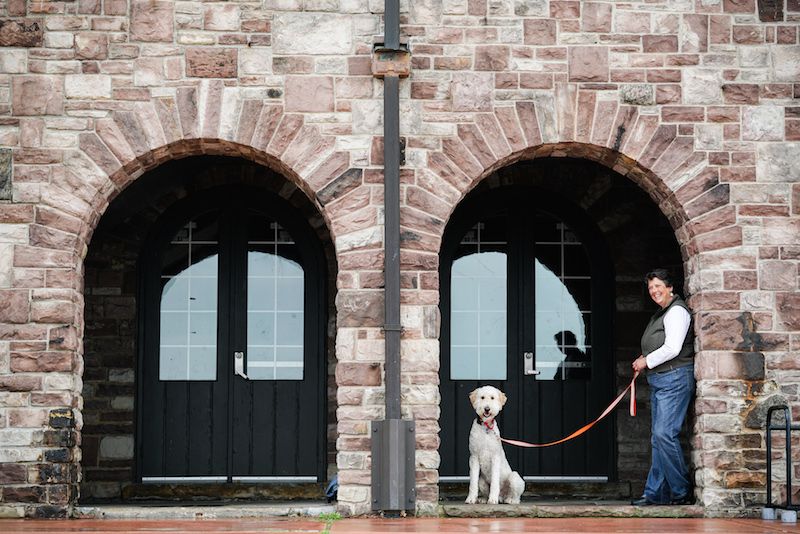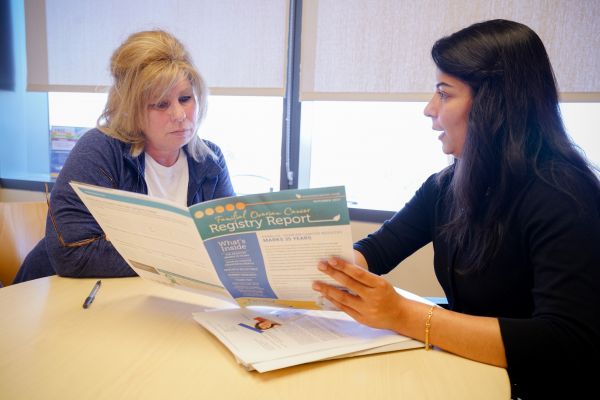I was running and I knew something felt wrong
Three years ago, on my 55th birthday, I got a lousy present. I was running with two friends, and I just didn’t feel right. I’ve been a runner most of my adult life, and as a runner, you know your body pretty well. All year long, I’d noticed that I was getting slower, but on that day, I was also tired, and I felt a vague pain in my lower right abdomen. For the next few days, I tried to ignore the pain and the feeling of being “off.” But one day, after struggling through a few minutes of yet another bad run, I stopped in mid-stride, pulled out my phone, and called my doctor.
I was initially diagnosed with a hernia, but a hernia specialist ruled this out. In fact, because symptoms are often vague and there are no reliable screening tests at this time, ovarian cancer is often initially missed or misdiagnosed. Fortunately, my instinct told me I should go to my doctor for an OB/GYN exam.
After my exam, I was sent for an ultrasound, and when the ultrasound revealed a mass, I was sent for an MRI. The following day, my doctor called me while I was in the car. She asked if I wanted to pull over and I said, “No, just tell me what you have to tell me.” My doctor said that some fluid and a mass in my right ovary looked suspicious.
Never miss another Cancer Talk blog!
Sign up to receive our monthly Cancer Talk e-newsletter.
Sign up!Then my doctor said the words that quite possibly saved my life: “I want you to go to Roswell.”
Within days, I was in the office of my oncologist. After examining me, I was shown my MRI. “Yes, there’s a mass,” she told me. “It could be something; it could be nothing. But I won’t know until I go in and biopsy it.” Two weeks later, I had surgery, and it was confirmed that the mass was a malignant tumor. I had a complete hysterectomy and removed both of my ovaries.
Cancer Screening
Screening tests detect cancer’s hidden warning signs long before symptoms appear and when the disease is most treatable. Understand your screening needs and complete the cancer screening and prevention questionnaire to manage your cancer risk.
Learn MoreThe next week, my doctor told me that my cancer had been caught at stage II, and she kindly and clearly explained my treatment options. “You can do nothing, but I don’t recommend that. You can have traditional IV chemo, with just a chest port. Or, you can go with more aggressive treatment: intraperitoneal (IP) chemotherapy, through an abdominal port, along with IV chemo through a chest port. We know that this combo of IV and IP chemo has a high rate of success, but because it involves higher doses of chemo, it can be very tough on your body. But I think you can do it, and if it becomes too much, we can discontinue it at any time.”
Together, we decided to pursue the more aggressive treatment option. I didn’t know it at the time, but I later learned that Roswell Park is one of the only centers in the area that offers this type of treatment. The surgery and treatment were indeed very tough, but I got through them with a lot of help. I remember being visited by a friend in my hospital room the day after my surgery. While I hurt physically, I also hurt emotionally. I remember telling my friend, “I have to say, I’m a little angry. I take care of myself. I try to be active and positive and eat well. I don’t deserve this.” To which my very wise friend said, “No one ‘deserves’ to get cancer. But, unfortunately, it happens. So, take your anger and use that energy to fight to get better.”
That advice, and the support of family and friends, served me well. I had IV chemo each Tuesday for 14 consecutive weeks, combined with IP chemo every three weeks. Each week, I’d feel pretty lousy from Wednesday through Sunday. By Monday I’d start to feel good, and then on Tuesday I’d have chemo again and start all over. During chemo, I had some complications, including mouth sores, neuropathy, and some severe allergic reactions that burnt my skin. But any time there was a problem, my care team worked with me to help eliminate or treat the problem. Thanks to my wonderful care team and support network, I always felt like I would somehow get through this.
Friends and family prepared meals, helped me with transportation to and from chemo, and helped me with my “mom taxi” duties. Because I am self-employed, I was able to work on a reduced level, and my clients were generous and understanding. Almost every day, I walked with my friends, and we talked and laughed. Some days the walks were short, and some days it took all my energy to get out the door. But I always felt better after those walks. And, I learned a lot about gratitude.
In what could have been the worst time of my life, I was actually filled with gratitude.
I will never take for granted that I was lucky enough to feel the pain in my abdomen before it spread too much, because with ovarian cancer, many women don’t feel any concrete symptoms until it’s too late. And, while ovarian cancer has a high rate of recurrence, my doctors has assured me that because my cancer was caught early and I had aggressive chemo, at three years post-surgery, I have a very good prognosis for long-term survival. Now, more than ever, I am grateful for each day that I get to spend with my family and friends. And I am grateful that I came to Roswell Park, where so many amazing people, from the person who cleaned my hospital room, to my wonderful nurses, doctors, and all those researchers, who continue to work for a cure made an indelible difference in my life.
Editor’s Note: Cancer patient outcomes and experiences may vary, even for those with the same type of cancer. An individual patient’s story should not be used as a prediction of how another patient will respond to treatment. Roswell Park is transparent about the survival rates of our patients as compared to national standards, and provides this information, when available, within the cancer type sections of this website.

